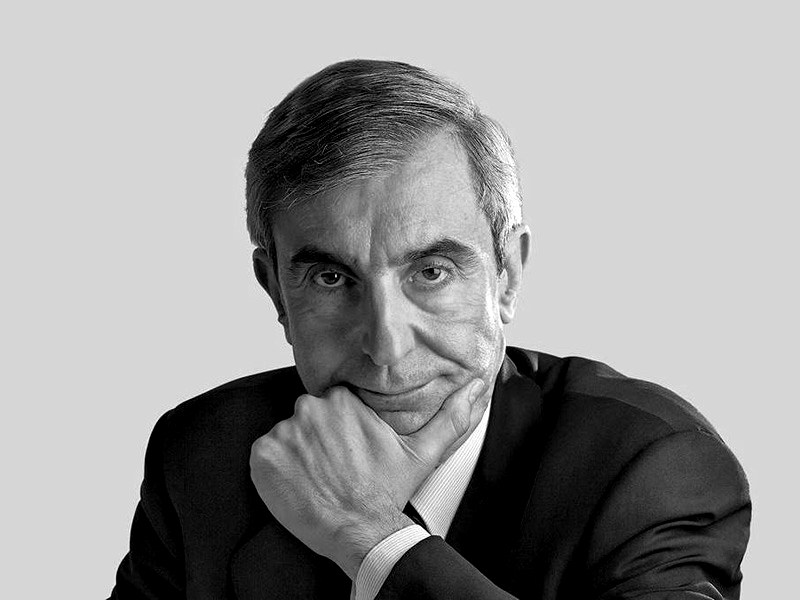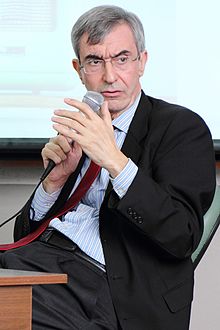
Interview
Journalist and neurologist. Summarizing Nelson Alberto Castro (63) in these two professions may not give the dimension of their importance for medicine and the media in Argentina.
Medicine and journalism were a child’s dream come true. In 1974, he started medical school at the University of Buenos Aires, in parallel with his studies in journalism at the Escola Superior de Jornalismo of the Grafotécnico Institute.
With a specialization in political journalism at Harvard, he began in the 1980s a radio career that continues today. In 1986, he was in the United States to pursue a graduate degree in medicine, when he was asked, as a foreign journalist, to cover the presidential press conference on Irangate, a political scandal with President Ronald Reagan.
Television changed everything
 Until 1993, he continued to work as a neurologist, when television changed everything. That year, he was invited by Mariano Grondona, a renowned Argentine journalist and academic, to explain on his TV program the health problem of then President Carlos Menem.
Until 1993, he continued to work as a neurologist, when television changed everything. That year, he was invited by Mariano Grondona, a renowned Argentine journalist and academic, to explain on his TV program the health problem of then President Carlos Menem.
From that day, his office would receive not only patients, but people curious to listen to the opinion of the television doctor. “This is unethical, I thought, and I put an end to my career,” Nelson said in an interview with La Nación in 1999.
In 1994, he officially started working on television. For 20 years, he ran the El Juego Limpo program on the Clarín Group’s TN news channel. Author of several books, Nelson also works as a columnist for the daily newspapers La Nación, Pagina / 12 and Perfil. A member of the National Academy of Journalism in Argentina, he has won awards both nationally and internationally.
Nelson Castro was one of the speakers at the 7th Argentine Congress of Health Auditors and Managers, in Buenos Aires. Nicole Cordoba, a collaborator with the ProSanitas BSC partner, interviewed the medical journalist on topics such as the reality of medicine in Argentina, the media and the role of social networks.
Dr. Nelson Castro, is patient safety today sufficiently assured in the Argentine health system?
Nelson Castro: The problem that the health system in Argentina has today is irregularity. There are places that, yes, care is of the first level, and there are places that really are a danger, whether private or public hospitals. I believe that this is a real challenge that medicine in Argentina has within the scope of health.
People who are responsible for health management, and who are not always doctors, should evaluate this and give a parity, which is not present today and is the greatest need we have so that everyone can have access to quality health care in Argentina. Unfortunately, today this inequality seems to be far from over. On the contrary, in many cases it is increasing.
Has the health system used the necessary mechanisms to prevent or reduce errors?
Nelson Castro: It is irregular, for example: there are public agencies in which the work is very good, but the problem sometimes happens in private entities, because the level of systemic control is lower and the parameters are not the same.
Sometimes, I have to treat patients both in the public and private spheres and I see this irregularity, this lack of control. As well as I know places where control is excellent in cleaning the team, from hand washing procedures to the clothes they use.
This irregularity worries me, because there are places where quality and control are loose or very bad and the patient is exposed to a risk that is currently unacceptable.
How do you think the media can contribute to patient education in personal care?

Nelson Castro: The media are important for the medical community, especially for prevention, which has a key role in public health, built on the basis of individual health.
In the health system, prevention is essential, as well as immediate consultation. These are two issues that must be dealt with intensely, since they are irregular and are not present today.
Medical societies must make codes, times and forms known through the media, through effective communication that society badly needs.
In times past, I think that medicine had a negative view of the media. This is changing and must change quickly, because today the media is fundamental to advancing public health and prevention issues, which are essential to achieve better health.
The media have become allies of the health system in raising awareness. How do you see the role of social networks?
Nelson Castro: It all depends on how we use them. They fulfill a positive function, if the medical system is active in the networks, being present with messages, following the dynamics and intensity required by social networks.
If they are left to free will and are not administered, any type of information may appear and, especially, information that cannot be checked.
So it is very important to know how to take advantage of social networks in medicine. They are a fundamental instrument for what represents prevention and the possibility of quick research on different pathologies.



